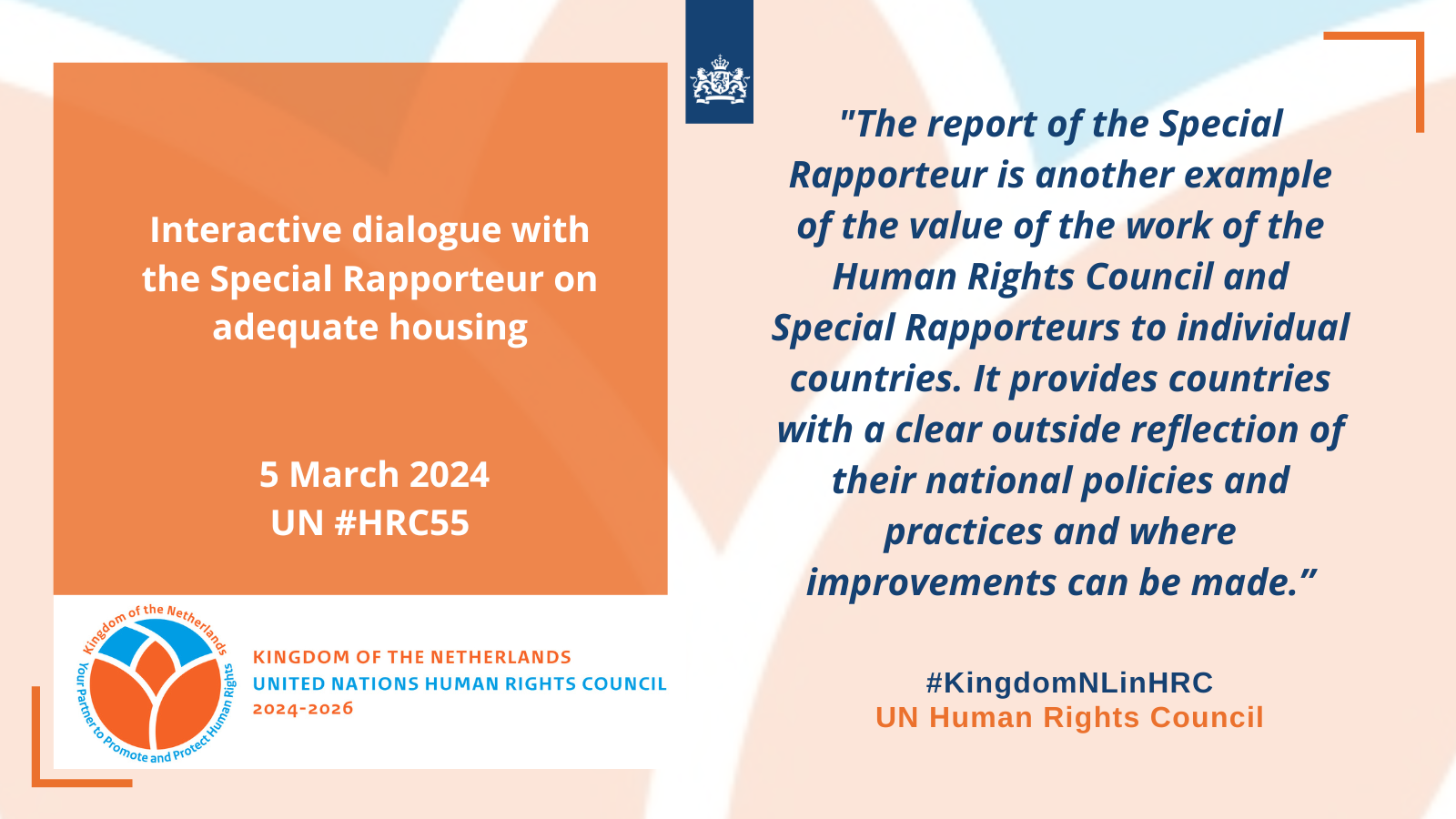Adequate housing: Interactive dialogue Special Rapporteur - PR UN, WTO and other organisations Geneva
Adequate housing: Interactive dialogue Special Rapporteur
Statement of the Kingdom of the Netherlands delivered by H.E. Ambassador Paul Bekkers, Permanent Representative, Permanent Representation of the Kingdom of the Netherlands to the UN in Geneva
Thank you Mr. President,
I would like to express our gratitude on behalf of the Netherlands
for the extensive working visit of the Special Rapporteur to the
Netherlands in December last year. Professor Rajagopal came well
prepared. He took plenty of time to study the many facets of Dutch
public housing policy.
He discussed the main points of the policy
with top officials and visited individual households for
behind-the-door meetings.
This has resulted in a comprehensive report.
The Special Rapporteur concludes his report with a total of 65 recommendations, spread over 8 categories. In the short time that is given to me in this intervention, I would not be able to do Professor Rajagopal's report justice. So let me start by underlining that the report will get the attention it deserves from my Government. The report will be presented to the Dutch Parliament, accompanied by an extensive policy response form the Government. We will also forward this response to the UN Human Rights Council.
Having said that, I cannot avoid briefly mentioning a few
things:
1. The Special Rapporteur rightly notes that the
Netherlands has been facing an acute housing crisis, manifesting
itself as a crisis of both availability and affordability. There are
several causes for this crisis. The Netherlands is the second most
densely populated Member State in the EU (5 times more inhabitants per
m2 than the EU average) and the fastest growing of all Member States
which is a major cause of the housing crisis we are currently
experiencing. The Special Rapporteur notes that many good steps have
been taken in the past two years to tackle this crisis. He makes
several recommendations to further improve the policy. We will take
this to heart.
2. The Special Rapporteur makes quite some
recommendations to adjust national legislation. Most recommendations
fit in well with processes that are already underway. The Netherlands
considers the advice to amend the Constitution to be quite
far-reaching. The Public Housing Management Act provides an adequate
set of instruments to fulfil the constitutional mandate and to steer
how much, for whom, and where we build at a faster pace and more
control to realize more affordable housing. The new Public Housing
Governance Act (Wet Versterking Regie Volkhuisvesting) clarifies and
gives substance to the responsibilities and competences of the
different tiers of governments, adds new legal instruments and
strengthens the ‘line of command’ in order to ensure proper regional
coordination of public and private actors to attain the national
quantitative mid-term public goals for affordable housing.
3.
The Special Rapporteur notes that policy has been organised in a
fragmented manner since the dissolution of the Ministry of Housing in
2010 and recommends that this ministry be reinstated and that all
public housing tasks be brought together there. Our response to this
is that in recent years there has already been a dedicated Minister of
Housing and Spatial Planning, who has ensured a better coordinated
policy. Setting up a new Ministry of Housing takes time and will
deteriorate the performance power for some time. Whether there will be
a separate ministry again is up to the next cabinet: Negotiations
about a new government are currently underway.
4. The Special
Rapporteur notes that the Dutch have a long and rich tradition in
social housing characterised by quality housing, providing affordable
homes for lower, and to some extent, to middle-income households. The
Dutch government and the Special Rapporteur agree that this is
something that needs to be nurtured and requires maintenance,
otherwise it will become unaffordable for low- and middle-income
groups to live in cities. Spatial segregation must be avoided. In
addition to problem areas, the Special Rapporteur has also seen
examples of places where good cooperation took place to increase the
quality of life in neighbourhoods. We think that the Inner City
Problems (Special Measures) Act provides municipalities with
instruments to improve these neighbourhoods, including for the most
vulnerable groups. Amendments to the Inner City Problems (Special
Measures) Act that have been submitted to Parliament also have the
approval of the National Coordinator against Discrimination and
Racism.
5. The Special Rapporteur rightly states that
specific policies are needed for specific target groups, such as
students and migrant workers. Each of these groups have different
housing needs. Improvements are indeed possible in this respect and
that has our attention.
6. Finally, a note on the reception
of refugees and asylum seekers. The Special Rapporteur has visited
several emergency shelter locations in the Netherlands. He noted a
number of shortcomings, but also saw that the employees work with
great dedication and care on a daily basis. In our opinion, the
conclusion that the housing at reception locations is substandard is
too general and drawn too quickly. We recognize that reception options
for asylum seekers have been too limited, and that this problem has
further increased with the arrival of Ukrainian refugees, but with the
adoption of the Distribution Law last January, steps are being taken
to improve the situation.
To conclude, I would once more like to thank the Special Rapporteur for his visit to the Netherlands and for providing us with such a comprehensive report. It is another example of the value of the work of the Human Rights Council and Special Rapporteurs to individual countries since it provides countries with a clear outside reflection of their national policies and practices and where improvements can be made. It is therefore that the Kingdom of the Netherlands will continue to extend a standing invitation to all mandate holders falling under special procedures of the Human Rights Council.
I thank you.

